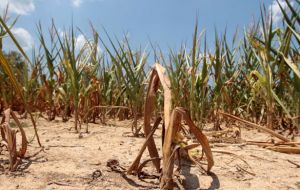MercoPress. South Atlantic News Agency
Aid for US farmers stalled in Senate; proposal to reduce bio-fuel mix in gasoline
 Yields of corn and soybeans have dropped dramatically
Yields of corn and soybeans have dropped dramatically The US House of Representatives passed a 383 million dollars disaster relief bill that provides political shelter for lawmakers during the worst drought in half a century, but may not release the aid for months to come.
Nearly two-thirds of the continental United States, including prime ranch and farm territory, is in the grip of drought and lawmakers were under pressure to help livestock producers under siege from soaring feed prices.
Congress has been deadlocked on passing a full farm bill but the drought portion was seen a way to get to aid to hard-hit ranchers, although it was unclear whether the Senate will move on the legislation.
The House bill, which allows payments of up to 100.000 dollars per farm, will help cattle and sheep ranchers but not hog and poultry. Row crop farmers have insurance but programs for livestock expired in 2011.
With the US Congress scheduled to begin on Monday a five-week vacation, there was little time for the Senate to act on the bill. Senators might reject it and insist on their five-year farm bill, which includes disaster aid for this year without the cuts demanded by the House, or let the bill wait until it returns on Sept 10.
“It's as simple as that: There is a problem out there. Let's fix it,” said House Agriculture Committee Chairman Frank Lucas ahead of the 223-197 passage of the bill. He promised to press for a farm bill this fall.
Main-line farm groups were lukewarm toward the disaster bill, saying it came at an unfair price, 639 million dollars in soil and water conservation cuts, including 256 million dollars for deficit reduction, when a full-scale farm bill is needed. Environmental, sportsmen and conservation groups opposed it.
“It's better than nothing. It's not what we should be doing,” said Collin Peterson, the Democratic leader on the Agriculture Committee. He predicted the bill would stall in the Senate.
If enacted, it could be nearly half a year before producers see aid. The House bill allows three months for the Agriculture Department to write rules for disaster aid before it accepts claims for aid and calculates a payment.
Under the bill, USDA would pay 75% of the value of livestock killed by drought and 60% of feed costs for one to three months for stock on the range, depending on severity of drought in a locality. There was also 20 million for feed and water shortages for livestock producers, bee keepers and fish farmers as well as a program to help tree farmers.
Bob Goodlatte of Virginia, a former Agriculture Committee chairman, said the Obama administration should reduce the federal requirement to mix bio-fuels into gasoline as a drought relief step, given the severe damage to the corn crop.
“We should not be in the position of choosing between food and fuel,” said Goodlatte, who helped organize a letter, signed by 150 representatives that support a “meaningful nationwide adjustment” of the mandate to use corn-based ethanol.




Top Comments
Disclaimer & comment rulesCommenting for this story is now closed.
If you have a Facebook account, become a fan and comment on our Facebook Page!